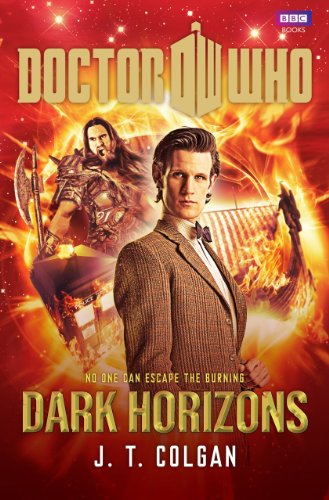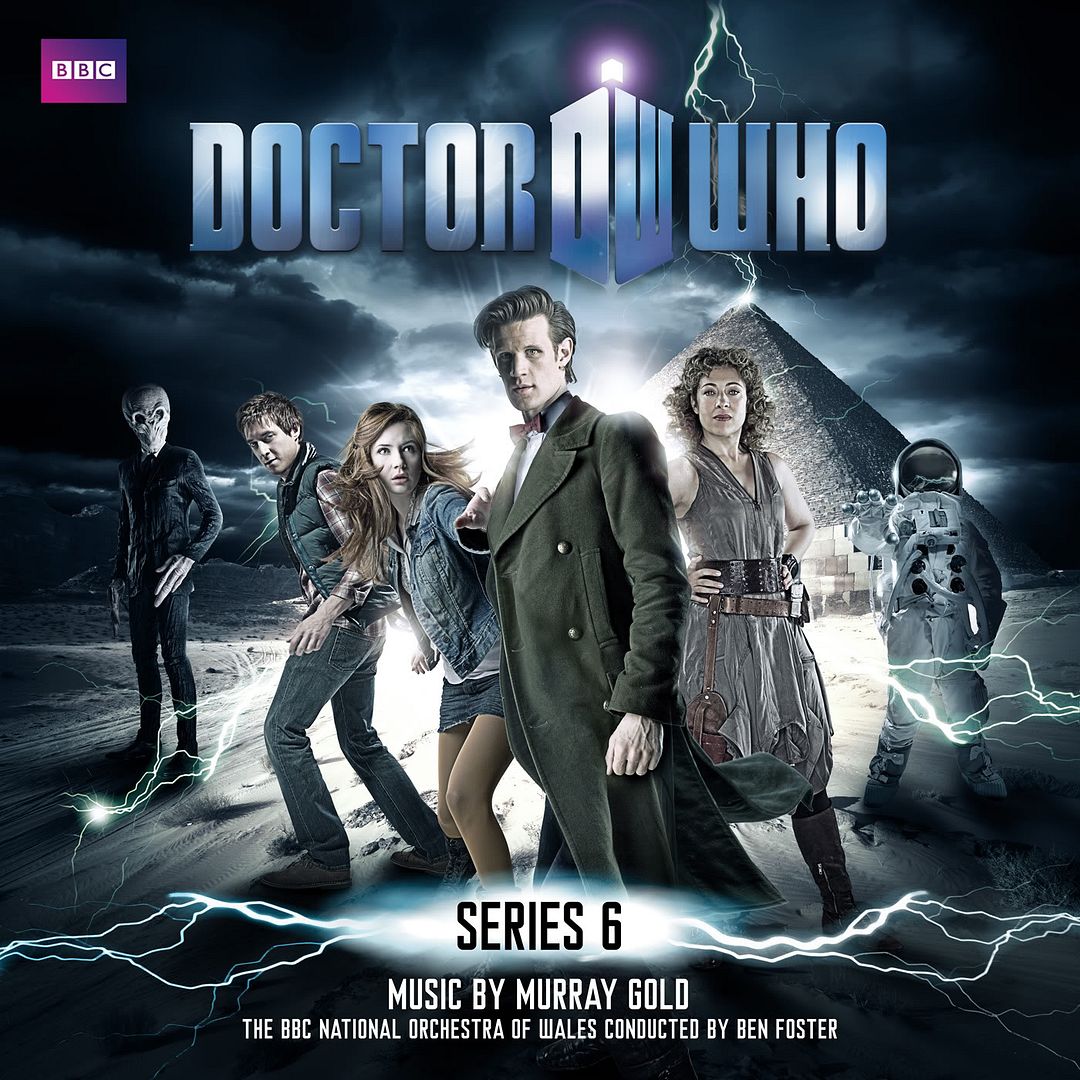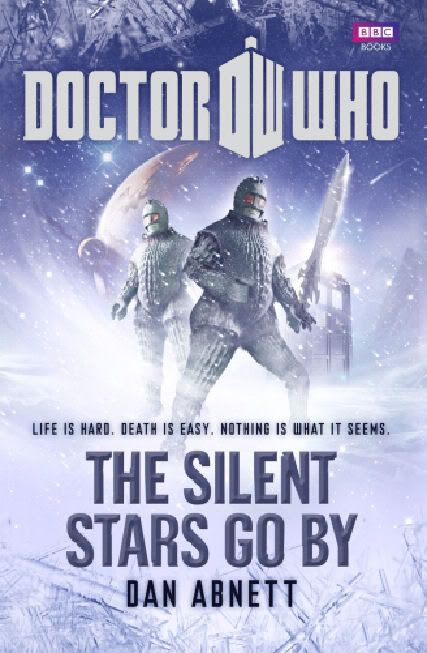Doctor Who: Dark Horizons
Saturday, 7 July 2012 - Reviewed by Matt Hills
This review contains plot spoilers
Dark Horizons is a well-crafted, enjoyable Doctor Who story carrying more than an occasional hint of J.T. Colgan’s primary career as a writer. Better known as Jenny Colgan, author of “chick lit” titles such as Meet Me At the Cupcake Café and Amanda’s Wedding, here Colgan brings romancing, character-driven sensibilities to the action-adventure world of the eleventh Doctor. There’s a running gag about the Time Lord’s knowledge of women – or lack of it – and his (un)suitability as an advisor on matters of the heart. Plus there’s a burgeoning romance between Princess Freydis and her captor Henrik (who oddly shares his name with a twenty-first century department store). Since the Doctor is travelling alone, Freydis and Henrik act as stand-in companions. It's a role these characters play rather effectively, even if Freydis strikes an overly familiar note as feisty and proto-feminist, while Henrik closely resembles Rory in at least one crucial way.
Again drawing attention to the fact that J.T. Colgan is Jenny Colgan, at one point the Doctor declares that if he fully understood human motivations he’d “retire to a hammock with a rather excellent hat and read a lot of novels with pink covers” (p.294), conjuring an image of the Time Lord as a holidaying "chick lit" consumer. But the in-jokes and the romance subplot simply add to a tale well-told, as the Doctor struggles to understand and combat a mysterious fire threatening twelfth century islanders and Vikings alike.
Dark Horizons, like The Coming of the Terraphiles before it, offers a strong argument for welcoming new voices and unexpected writers into the fold. The result this time is a Doctor Who adventure that has a vibrant freshness of touch, and a willingness to do things which old hands might deem unconventional, such as challenging the TARDIS’s powers and potency. One stand-out sequence has the police box proving to be a rather useless submarine whilst the Doctor realizes his time machine might, for once, prove more of a hindrance than a help.
Colgan’s authorial voice also shines through via a focus on character, though her historical figures sometimes read as thinly veiled versions of contemporary norms. It seems that the past is merely a different county; they do things pretty much the same there. Mind you, the TV series already has form on this, and one could just as well argue that Colgan is faithfully emulating the approach of The Fires of Pompeii. In terms of structure, this feels a lot like a Russell T. Davies tale, with the action-oriented storyline ending some time before the novel’s eventual closure and being followed by a coda leaving readers with a warm, fuzzy glow inside. Colgan has seemingly blended a cocktail of showrunners’ tics and tropes: Moffat’s take on monstrosity combined with Davies’s greater feeling for feeling.
And there are some ‘Easter egg’ treats for attentive readers, such as the Doctor’s knowledge of Busted lyrics in Chapter Eighteen, and some delightfully unexpected cameos in Chapter Nineteen. Colgan’s writing enacts its very own time travel in the latter case, skilfully proffering a sudden, vertiginous narrative switch to the present day. This gives her story added scope and scale, and brings home the fact that ancient history can linger unseen within nooks and crannies of the here-and-now. It’s a smart literary trick well suited to the omniscient narrator, and rather more difficult to pull off on TV.
The eleventh Doctor is well depicted, with Matt Smith’s performance style and quickfire dialogue being well captured. And although the Doctor’s method of overcoming the fiery antagonist he faces is very strongly signposted, there are still some unexpected twists and turns along the way. I suspect that BBC Books are deliberately commissioning these stand-alone releases as distinctly seasonal titles; the snowy, silvery Silent Stars Go By was aimed squarely at last year’s Christmas market, while this blazing red-and-bronze effort appears designed as a summer read, with the forthcoming Wheel of Ice again having a wintry feel in time for Christmas 2012. Or perhaps it’s mere coincidence that the range has settled into this publishing schedule of snow, fire, and ice. Given current British weather, BBC Books might be better off acquiring a novel about biblical floods or misbehaving climates for next summer.
As well as expertly catching the eleventh Doctor’s persona, Colgan also has some fun with how he is perceived. Thought to be a God, his identity is recurrently linked to that of Loki, the trickster. It’s a not uncommon parallel for the Time Lord, but one that’s especially relevant to Matt Smith’s Doctor, and also one that’s well integrated into the milieu of this story rather than ever feeling forced or tricksy. Freydis ponders whether the Doctor will meet the fate foretold for Loki, and in turn I wondered whether the novel would leave this thread hanging, implying some wider story arc or foreshadowing. But ultimately it seems that things are all tidied away by the time the Doctor departs for further adventures.
This is another satisfying novel from BBC Books. It features an intriguing, well-developed foe for the Doctor, and it successfully incorporates Colgan’s interests and writing style into Doctor Who. However, on a more critical note I do think that crediting this to "J.T." Colgan is an unhelpful bit of marketing wisdom. Are Jenny Colgan’s fans really going to order this title – with its foil DW logo – expecting it to be her usual brand of writing? Are Doctor Who fans going to read this without an awareness of “J.T”’s identity, given the author photo and description provided inside the back cover? The Coming of the Terraphiles was arguably a less ‘authentic’ Who novel than this, but there was no sign of that being written by “M.J.” Moorcock. Instead, Moorcock’s readers and Doctor Who fans were assumed to form a unified or at least non-antagonistic taste bloc (itself a potentially fallacious assumption). Coy and unconvincing author’s initials convey the shortsighted impression here that modern Doctor Who can’t or shouldn’t be clearly attributed to a bestselling “chick lit” writer. I can’t help but wonder what feisty Princess Freydis would make of this state of affairs. Or whether one “V.A.” Lambert would have sanctioned such dark, narrow horizons of gender and genre.
Dark Horizons is a well-crafted, enjoyable Doctor Who story carrying more than an occasional hint of J.T. Colgan’s primary career as a writer. Better known as Jenny Colgan, author of “chick lit” titles such as Meet Me At the Cupcake Café and Amanda’s Wedding, here Colgan brings romancing, character-driven sensibilities to the action-adventure world of the eleventh Doctor. There’s a running gag about the Time Lord’s knowledge of women – or lack of it – and his (un)suitability as an advisor on matters of the heart. Plus there’s a burgeoning romance between Princess Freydis and her captor Henrik (who oddly shares his name with a twenty-first century department store). Since the Doctor is travelling alone, Freydis and Henrik act as stand-in companions. It's a role these characters play rather effectively, even if Freydis strikes an overly familiar note as feisty and proto-feminist, while Henrik closely resembles Rory in at least one crucial way.
Again drawing attention to the fact that J.T. Colgan is Jenny Colgan, at one point the Doctor declares that if he fully understood human motivations he’d “retire to a hammock with a rather excellent hat and read a lot of novels with pink covers” (p.294), conjuring an image of the Time Lord as a holidaying "chick lit" consumer. But the in-jokes and the romance subplot simply add to a tale well-told, as the Doctor struggles to understand and combat a mysterious fire threatening twelfth century islanders and Vikings alike.
Dark Horizons, like The Coming of the Terraphiles before it, offers a strong argument for welcoming new voices and unexpected writers into the fold. The result this time is a Doctor Who adventure that has a vibrant freshness of touch, and a willingness to do things which old hands might deem unconventional, such as challenging the TARDIS’s powers and potency. One stand-out sequence has the police box proving to be a rather useless submarine whilst the Doctor realizes his time machine might, for once, prove more of a hindrance than a help.
Colgan’s authorial voice also shines through via a focus on character, though her historical figures sometimes read as thinly veiled versions of contemporary norms. It seems that the past is merely a different county; they do things pretty much the same there. Mind you, the TV series already has form on this, and one could just as well argue that Colgan is faithfully emulating the approach of The Fires of Pompeii. In terms of structure, this feels a lot like a Russell T. Davies tale, with the action-oriented storyline ending some time before the novel’s eventual closure and being followed by a coda leaving readers with a warm, fuzzy glow inside. Colgan has seemingly blended a cocktail of showrunners’ tics and tropes: Moffat’s take on monstrosity combined with Davies’s greater feeling for feeling.
And there are some ‘Easter egg’ treats for attentive readers, such as the Doctor’s knowledge of Busted lyrics in Chapter Eighteen, and some delightfully unexpected cameos in Chapter Nineteen. Colgan’s writing enacts its very own time travel in the latter case, skilfully proffering a sudden, vertiginous narrative switch to the present day. This gives her story added scope and scale, and brings home the fact that ancient history can linger unseen within nooks and crannies of the here-and-now. It’s a smart literary trick well suited to the omniscient narrator, and rather more difficult to pull off on TV.
The eleventh Doctor is well depicted, with Matt Smith’s performance style and quickfire dialogue being well captured. And although the Doctor’s method of overcoming the fiery antagonist he faces is very strongly signposted, there are still some unexpected twists and turns along the way. I suspect that BBC Books are deliberately commissioning these stand-alone releases as distinctly seasonal titles; the snowy, silvery Silent Stars Go By was aimed squarely at last year’s Christmas market, while this blazing red-and-bronze effort appears designed as a summer read, with the forthcoming Wheel of Ice again having a wintry feel in time for Christmas 2012. Or perhaps it’s mere coincidence that the range has settled into this publishing schedule of snow, fire, and ice. Given current British weather, BBC Books might be better off acquiring a novel about biblical floods or misbehaving climates for next summer.
As well as expertly catching the eleventh Doctor’s persona, Colgan also has some fun with how he is perceived. Thought to be a God, his identity is recurrently linked to that of Loki, the trickster. It’s a not uncommon parallel for the Time Lord, but one that’s especially relevant to Matt Smith’s Doctor, and also one that’s well integrated into the milieu of this story rather than ever feeling forced or tricksy. Freydis ponders whether the Doctor will meet the fate foretold for Loki, and in turn I wondered whether the novel would leave this thread hanging, implying some wider story arc or foreshadowing. But ultimately it seems that things are all tidied away by the time the Doctor departs for further adventures.
This is another satisfying novel from BBC Books. It features an intriguing, well-developed foe for the Doctor, and it successfully incorporates Colgan’s interests and writing style into Doctor Who. However, on a more critical note I do think that crediting this to "J.T." Colgan is an unhelpful bit of marketing wisdom. Are Jenny Colgan’s fans really going to order this title – with its foil DW logo – expecting it to be her usual brand of writing? Are Doctor Who fans going to read this without an awareness of “J.T”’s identity, given the author photo and description provided inside the back cover? The Coming of the Terraphiles was arguably a less ‘authentic’ Who novel than this, but there was no sign of that being written by “M.J.” Moorcock. Instead, Moorcock’s readers and Doctor Who fans were assumed to form a unified or at least non-antagonistic taste bloc (itself a potentially fallacious assumption). Coy and unconvincing author’s initials convey the shortsighted impression here that modern Doctor Who can’t or shouldn’t be clearly attributed to a bestselling “chick lit” writer. I can’t help but wonder what feisty Princess Freydis would make of this state of affairs. Or whether one “V.A.” Lambert would have sanctioned such dark, narrow horizons of gender and genre.
 Written by J. T. Colgan
Written by J. T. Colgan











